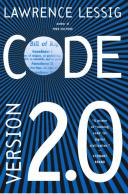Книга: Code 2.0
The Regulations of Speech: Free Culture
The Regulations of Speech: Free Culture
The third context in which to consider the special relevance of cyberspace to free speech follows directly from Chapter 10. As I describe there, the interaction between the architecture of copyright law and the architecture of digital networks produces an explosion of creativity within reach of copyright never contemplated by any legislature.
The elements in that change are simple. Copyright law regulates, at a minimum, “copies.” Digital networks function by making “copies”: There’s no way to use a work in a digital environment without making a copy. Thus, every single use of creative work in a digital environment triggers, in theory at least, copyright.
This is a radical change from life in real space. In real space, there are any number of ways to “use” a creative work without triggering the law of copyright. When you retell a joke to friends, the law of copyright is not invoked — no “copy” is made, and to friends, no public performance occurs. When you loan a friend your book, the law of copyright is not triggered. When you read a book, the law of copyright would never take notice. Practically every single ordinary use of culture in real space is free of the regulation of copyright. Copyright targets abnormal uses — such as “publishing” or public performances.
The gap between normal and abnormal uses began to close as the technologies for “copying” were democratized. Xerox created the first blip; cassette tape recorders were close behind. But even these technologies were the exception, never the rule. They raised copyright questions, but they didn’t inject copyright into the center of ordinary life.
Digital technologies have. As more and more of ordinary life moves onto the Internet, more and more of ordinary life is subject to copyright. The functional equivalent to activities from real space that were essentially unregulated is now subject to copyright’s rule in cyberspace. Creativity activity that never needed to grapple with copyright regulation must now, to be legal, clear a whole host of hurdles, some of which, because of the insanely inefficient property system that copyright is, are technically impossible. A significant portion of creative activity has now moved from a free culture to a permission culture. And the question for the values of free speech is whether that expanded regulation should be allowed to occur unchecked.
Again, I have my own (overly strong) views about the matter[69]. I continue to be astonished that a Court so keen to avoid “raising the costs of being a producer of sexual materials troubling to the majority”[70] is apparently oblivious to the way copyright law raises the costs of being a producer of creative and critical speech.
But for our purposes here, we should simply note once again a latent ambiguity in our constitutional tradition. As the Supreme Court has held, the First Amendment imposes important limitations on the scope of copyright. Among those are at least the requirements that copyright not regulate “ideas”, and that copyright be subject to “fair use.”
But these “traditional First Amendment safeguards” were developed in a context in which copyright was the exception, not the rule. We don’t yet have a tradition in which every single use of creative work is subject to copyright’s reach. Digital technologies have produced that world. But most of the rest of the world has not yet woken up to it.
So what should First Amendment values be in this world? One view is that the First Amendment should have no role in this world — beyond the minimal protections of the “idea/expression” distinction and the requirement of “fair use.” In this view, the scope of Congress’s regulation of creative activities is, subject to these minimal conditions, plenary. Any creative act reduced to a tangible form could be subject to the monopoly right of copyright. And as every creative act in digital context is reduced to a tangible form, this view means that everything in the digital world could be made subject to copyright.
The opposite view rejects this unlimited scope for copyright. While the monopoly right of copyright makes sense in certain commercial contexts, or more broadly, makes sense where it is necessary to “promote . . . progress”, there is no legitimate reason to burden the vast majority of creative expression with the burdens of copyright law. That a kid making a video book report needs to clear permissions with the author of the book, or that friends making a mashup of a favorite artist can’t do so unless the label has granted them permission, extends the reach of copyright beyond any legitimate purpose.
But between these two views, it is plain that the Framers never made a choice. They were never confronted with the option that copyright could (efficiently) control every single use of a creative work. Any control possible in 1790 would have been radically too burdensome. And while I have my bets about how they would vote, given their strong antipathy to monopolies and the very restrictive IP clause they enacted, that’s nothing more than a bet. If there’s a choice to be made here, it is a choice they didn’t make. It is instead a choice that we must make: Whether the values of free speech restrict this radical increase in the scope of copyright’s regulation.
- Speech Lessons
- 4.4.4 The Dispatcher
- About the author
- Chapter 7. The state machine
- Appendix E. Other resources and links
- Appendix H. GNU Free Documentation License
- Example NAT machine in theory
- The final stage of our NAT machine
- Compiling the user-land applications
- The conntrack entries
- Untracked connections and the raw table
- Basics of the iptables command




